.
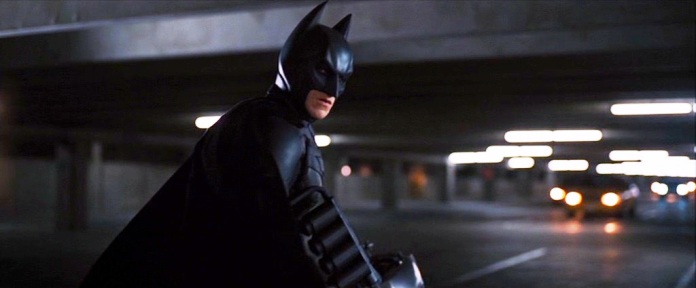
Director/Coscreenwriter: Christopher Nolan
By Roderick Heath
My antipathy for British-gone-Hollywood director Christopher Nolan and his brand of filmmaking—top-heavy, arrhythmic, moodily ambitious, yet often strangely hollow—has threatened on occasions to become irrationally intense. But it’s hard not to react vehemently when he receives such popular adoration in comparison to the modestly plastic virtues of his films. To his credit, as displayed by Inception (2010), Nolan is one of the relatively few directors in Hollywood who has been trying to use the modern industry’s financial resources, technical teams, and special-effects warriors with a sense of creative wonder to assert will over the personality-erasing tendencies of the CGI houses, and make them serve a fresh vision. The various sequential stunts of Inception were certainly sound and fury signifying nothing, but they were marvellously made sound and fury. In his best film to date, The Prestige (2006), he managed to bind together his themes in a tale where the trickiness actually managed to stand in for the emotional binds and sadomasochistic competitiveness of his characters.
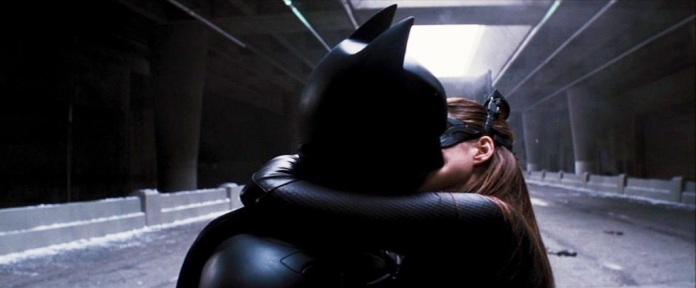
But always, in scratching the polished surfaces of Nolan’s films, the same disappointment. The silly plot gimmicks. The leaden dialogue. The confused, contradictory, and just plain gutless concepts that profess to populist profundity. The declarative placards of theme, character relations, and emotions in place of convincing dramatic depictions of each. The attempts to sustain high style ruined by muddled, even random-feeling filmic syntax. Just as Inception turned the psyche into a place of ponderously literal video game rules and sucked out all hints of sensuality and polymorphic possibility, so, too, his versions of Batman have reduced the iconography of the original comic books and other takes from surrealism-infused pop art into more theoretically realistic fare that feels no actual responsibility to realism.
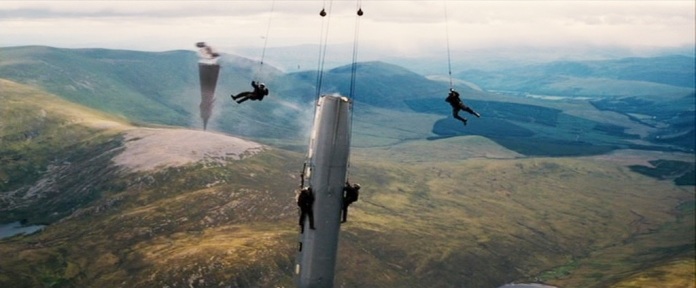
Looking back at my 2008 review of The Dark Knight through the prism of a second viewing, the film fell apart for me, and I wish I had written a harsher commentary. Still, I concluded with a line that, in light of the new film, is relevant: It may take a new, revved-up Catwoman to drag a reaction from this Batman that doesn’t sound like he merely needs a cough lolly. The Dark Knight Rises does indeed sport a new, revved-up Catwoman, though she’s never referred to as such, in the lissom form of Anne Hathaway (more on her later). The Dark Knight Rises sees Nolan’s franchise reach ever more optimistically for a mantle of epic import, and to be fair, the scope of its story does in some regards justify such aspiration.
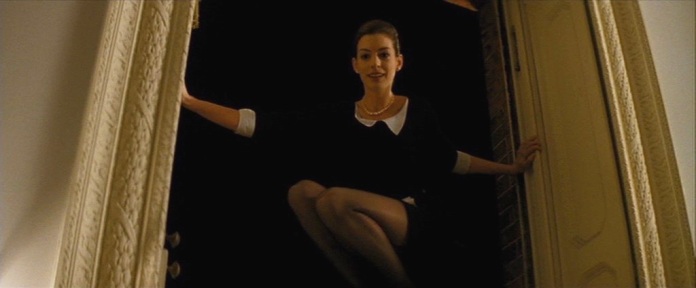
Bruce Wayne (Christian Bale) finds himself not only up against marauding supervillains, but also his own aging body and calcifying emotional reflexes. For eight years, Wayne’s been hiding out in his rebuilt mansion, having officially retired his Batman alter ego and let it take the blame for the murder of DA Harvey Dent and the deaths Dent caused in his lunatic final hours. Now Wayne limps around on a cane in a Howard Hughes-lite routine. Meanwhile, his former collaborator in crime fighting, Jim Gordon (Gary Oldman), has become Gotham City’s police commissioner. Gordon harbours guilt over the way a lie was used to venerate Dent’s name and enact the Dent Act that has seen Gotham cleaned up at last. During a political rally held at Wayne’s estate, but without his participation, cat burglar Selina Kyle (Hathaway), posing as a waitress, breaks into Wayne’s private safe and lifts both his mother’s pearl necklace and a set of his fingerprints. Wayne catches her in the act, but she casually knocks him about and slips away in the limousine of a congressman (Brett Cullen).
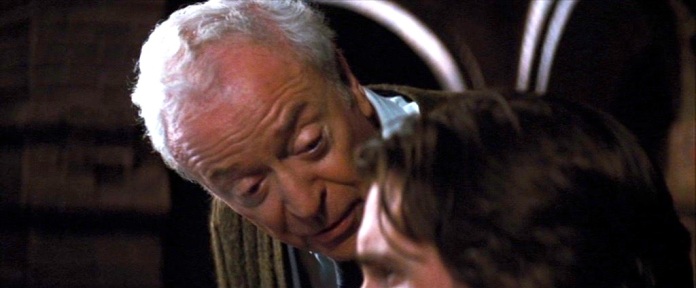
Wayne and his admirable Crichton, Alfred (Michael Caine), swiftly track Selina down, but she proves to be not simply a free agent, but enmeshed in a conspiratorial vortex where rival businessman Daggett (Ben Mendelsohn) is trying to take over Wayne Enterprises and bankrupt it at the behest of hulking mercenary Bane (Tom Hardy). Bane was once, and may still be, linked to the League of Shadows, a terrorist organisation whose boss, Ra’s al-Ghul (Liam Neeson), trained Wayne and whom Wayne turned against in Batman Begins (2005). In one of the most ludicrous action sequences I’ve ever seen, Bane kidnaps scientist Pavel (Alon Moni Aboutboul) from a CIA rendition plane in mid-air by rappelling from another plane, and it was all to make it look like Pavel died in a crash. Bane then sets himself up in Gotham’s sewers to stage-manage the destruction of Wayne/Batman before subjecting Gotham to a punitive purge.
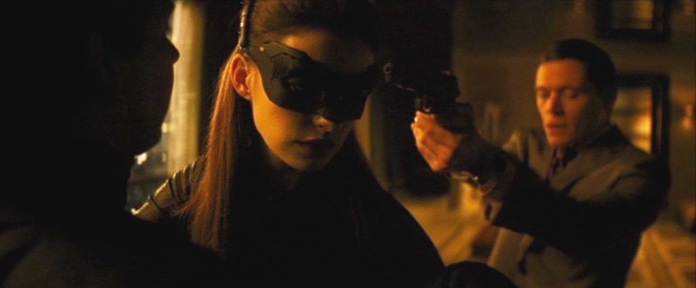
Wayne, who has expended most of his fortune on developing a fusion reactor that he mothballed when he learnt it could be turned into a nuclear weapon by Pavel, is left further shorn of his previous privileges as his company is bankrupted by Bane during a raid on the Gotham stock exchange. Soon, his belongings are being repossessed, and Alfred, afraid this time Bruce is biting off more than he can chew, abandons his boss mid-fight. Wayne gets Selina to guide him to Bane’s hideout, but this proves exactly what Bane wanted: he traps Wayne, beats him to a pulp, and breaks his spine before exiling him to the same don’t-say-it’s-Afghani prison where Bane himself once resided. Bane is then free to terrorise Gotham, setting off bombs all over the city, bringing down bridges, clogging up tunnels, and managing to trap most of the police underground, cutting Gotham off from the outside world, and taking it over as a supposedly revolutionary city-state.
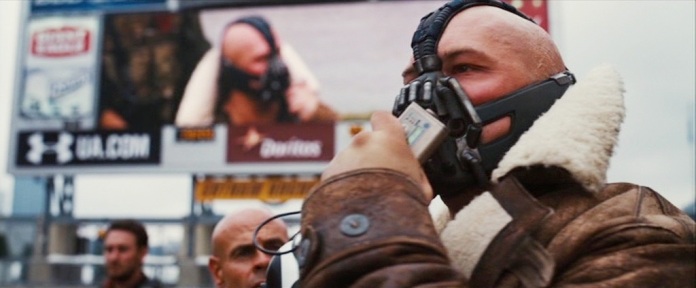
As per one consistent flaw in Nolan’s screenwriting (penned as usual with his brother Jonathan), he writes about 10 characters and three plot threads more than he can handle. Chief amongst the busy sprawl of supporting figures is John Blake (Joseph Gordon-Leavitt), a young rookie cop who grew up in a home for orphans once funded by Wayne Enterprises. Early in the film, Blake invites himself to Wayne Manor and reveals that he’s guessed Wayne is Batman because he’s noticed before that Wayne, like him, wears a mask of courteous contempt for the world (if it was that easy, shouldn’t there be at least a few more who have made the link, including Gordon, who’s still oblivious to the point?) and wants him to rejoin the fray. In another development, Alfred deliberately hurts Wayne by stating Wayne’s great, deceased love Rachel Dawes was planning on marrying Dent rather than him. Caine almost makes this poorly written and emotionally incoherent moment (is disillusioning Wayne and leaving an existential void where his romanticism used to be supposed to make him less likely to commit to a foolhardy course of bravado?) work purely by the force of his time-tested emotive quaver. Wayne seems to barely notice his life-long companion’s departure: Caine does return for a few seconds towards the end, with a show of emotion that sadly only made me want to wince for the ham-handed reintroduction. His place is momentarily filled by the agreeable form of Marion Cotillard’s Miranda Tate, an investor who seems to stick by Wayne in his travails, agreeing to help get his reactor working again—both the one he’s built and the one in his pants. Mendelsohn’s Daggett is cringe-inducing as both a piece of acting and of characterisation.
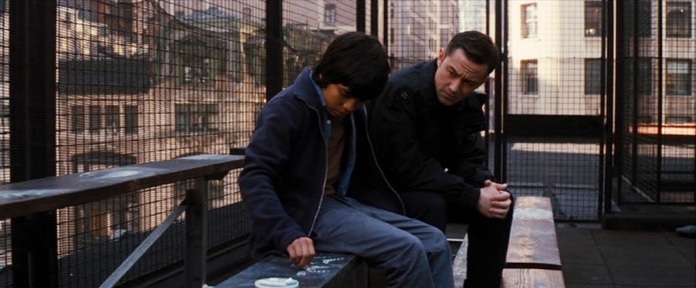
Normally, as anyone who reads my commentaries regularly knows, I go with the flow of action films: they are, after all, partly about their own absurdity, their freewheeling insolence towards the laws of physics and human feeling. But I find myself critiquing to different rules when the filmmakers obviously want to cloak themselves in a mantle of down-to-earth immediacy and relevant meaning, and when audiences so nakedly want to reward them for lending a tiny bit of viability to their adolescent fantasies. The film does some stunningly jerky, artless leaps of storytelling—or rather story-stating—early on, including Blake’s confrontation of Wayne and Wayne’s locating of Selina, chiefly so it doesn’t have to bother detailing such moments in a procedural fashion; that would demand care in staging. These are marvellous examples of Nolan’s info-dump idea of exposition. Even more clumsily handled is Selina’s “kidnapping” of the congressman, whom she brings as a cover to a meeting with Daggett’s slimy interlocutor Stryver (Burn Gorman, who suggests a middle-management edition of Skelton Knaggs) and still moans in lovelorn fashion after she abandons him on the floor, dazed and…what, drugged? Hypnotised? Shagged into perpetual confusion? Anyway, Selina will later be arrested and incarcerated for this crime.
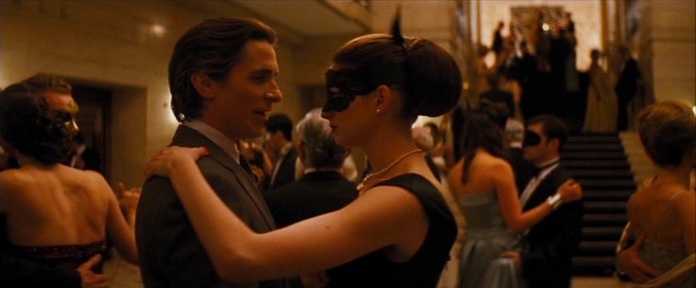
On a realistic level, the plotting and story development of The Dark Knight Rises ranges from the infantile to the frankly stupid. To name a few plot holes the size of small moons: Why is Bane’s method of snatching Pavel and faking his death so ridiculous? Why doesn’t it take about 30 seconds of solid police work in conference with some decent computer operators to find out what Bane did in the stock exchange and hack in to reverse it? How does Bane get Wayne to the prison? How does Wayne get back into Gotham after escaping the prison? Why is it that they can get enough food and supplies down to sustain 3,000 trapped policemen, but it’s so hard to get them out? What’s up with that whole trapped policemen thing, anyway? Can’t the highly trained police officers think of a better battle tactic than to march in ranks up a narrow street facing automatic weapons? Why did Wayne chicken because his reactor could be made into a bomb? Was that so frightening, as opposed to the several thousand other nuclear bombs and fission reactors in the world that could be put to the same use? So, after having one’s back broken, it only takes a bit of clumsy quack medical work and some push-ups to come back as a fully functioning superhero? I’m sure all the paraplegics in the world will be happy to hear that. I dare say there might be explanations for many of these points (and I’m sure someone’s just eager to tell me), but it’s clear that The Dark Knight Rises isn’t interested in clarity, but in relentless forward motion.
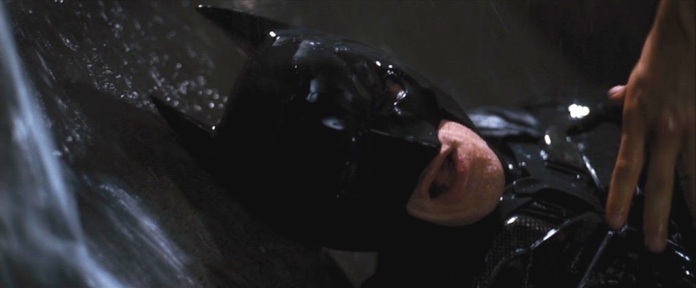
More to the point, Nolan still has no fundamental feel for the expressive rhythms of a film. Whilst all of his movies revolve nominally around emotional cruxes—romantic and familial tragedy are at the core of Memento (2000) and Inception and part of the background fabric here, whilst ferocious jealousy drives The Prestige—these seemingly vital aspects always remain sketches for empathy and involvement rather than the real thing. It’s like a 12 year old writing a tale of grand romance: we’re told what it is, but it is never felt. The Dark Knight Rises is supposed to tell the story of its hero’s complete fall before, yeah, rising. Which would be all well and good, except that Nolan and Bale’s Batman remains a blank space where a hero should be. The motif of his proving insufficient to take on Bane lacks force because Bale refuses to suggest any undue cockiness, frantic determination, or any other specific emotion to fight his insecurities apart from terse resolve. Similarly, his struggle to rebuild himself after Bane’s shock-and-awe annihilation of his physical, fiscal, and social prowess lacks any real moment of despair, of bottomed-out feeling or self-indulgent sorrow. Wayne lolls about in his prison bed and looks hairy and dour and then, a few push-ups later (crying out to be scored over with Team America: World Police’s immortal “Montage” song), is ready to try to climb out again. Nolan belabours rather than extracts any kind of thrill from Wayne’s repeated failures to escape. Critic Simon Abrams intelligently compared the insufficiency of these sequences with a forebear in John Frankenheimer’s French Connection II, but I’d rather cite a better superhero movie.
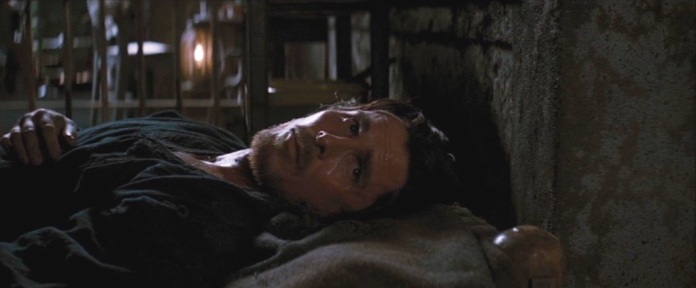
In spite of all the heady camp buzzing around its hero, Superman II (1980) still manages to offer up a singular scene where the newly human Kal-El is suddenly faced with his loss of strength, his unutterably human degradation, after he’s beaten up by a common barroom lout, spitting blood and attempting to maintain his good humour even as he trembles with pain and fear now that the world doesn’t bounce off his skin. By comparison, Wayne’s struggles here are so perfunctory, mechanical, and lacking personal passion that he seems far more alien than Superman ever has; Nolan can’t give us such a simple, well-felt emotional refrain. The Dark Knight Rises is less a work of epic storytelling than a three-hour montage—an approach that could be exciting if the montage work was at all about stretching the cinematic form, but here serves only the cause of pummelling event and exposition. It’s all too tempting to conclude that for general audiences, storytelling as an art is dead; they are now into the era of stuff happening, and lots of it. There is so much incident, it becomes incidental.
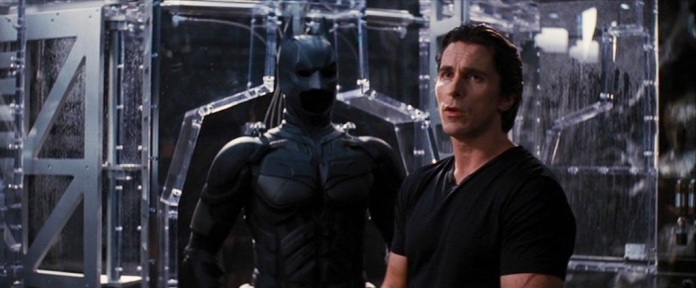
What can one say about the pretences of The Dark Knight Rises? Class war and anger are repeatedly invoked throughout. Selina is a demimondaine who has risen through thievery and possibly prostitution; her garb hinting at kinky exploits, she’s repeatedly seen hanging around with Jen (Juno Temple), more clearly a hooker and, judging by the way she hugs Selina at some points, something more for her. Bane and his fellow villains are the spirit of the oppressed surging for a spot of nihilistic insurrection. The French Revolution is clearly invoked as the wealthy are assaulted and dragged from their houses, a Bastille-like prison is broken open to release its criminal occupants, and citizens chosen as enemies of the people are given trials clearly meant to evoke the worst moments of the Reign of Terror. These parallels fascinated me deeply, chiefly because they reveal how pig-ignorant Nolan is of political history and how easily he can get away with assuming that of his audience, too. At one point, Gordon reads out the concluding passage of Dickens’ French Revolution novel A Tale of Two Cities, but unlike Star Trek II: The Wrath of Khan, which used that book to invoke the transcendental glory of sacrifice for a common good, this film’s common sacrifice turns out to be a fake. More specifically, Nolan buys into Dickens’ knock-kneed English liberal vision of the Revolution as badly shaven creeps in seamy, raffishly worn uniforms dragging random citizens to trial in an orgy of bloodlust, and bypassing the specific background of political paranoia, war, and high-profile defections, which turned the Revolution’s moment of transformative energy into a grim spiral of political homicide.
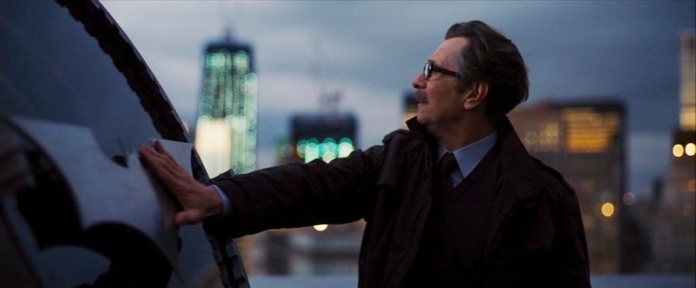
Not that there isn’t a good film to be made channelling the Revolution’s example into a contemporary context, but as in The Dark Knight, Nolan pays only the merest lip service to actual political relevance. Like Heath Ledger’s Joker, Bane and the League of Shadows have no genuine political programme in mind: they are determined to exact…revenge? Punishment? Ritual cleansing of perceived sins? Anyway, they actually intend to destroy Gotham and themselves in an auto-da-fé via the fusion reactor-bomb, an act which makes the rest of their actions pointless. Why don’t they just set the bomb off at the start and leave a big smoking hole in the ground where Gotham was rather than jump through all these ridiculous hoops? I could buy it if their kangaroo courts were being broadcast for the sake of inspiring fear and loathing in places other than Gotham, but they aren’t: they’re just giving their opponents time to rally against them. Rather, their intention is an act of nihilism, which frees Wayne and his allies in the police force and the system they maintain from any culpability, for the opposition is reduced to a perfect bogeyman of inchoate nastiness, and, by implication, anyone opposed to the settled order is seen as similarly, childishly, wantonly destructive. In short, the vision of good and evil proffered in these films is, far from being more ambiguous and questioning than the usual run, actually every bit as black and white as any cornball grayscale print from the ’40s. The key moment of disillusionment, when Bane reveals the truth about Dent to the city’s populace, has no apparent result.
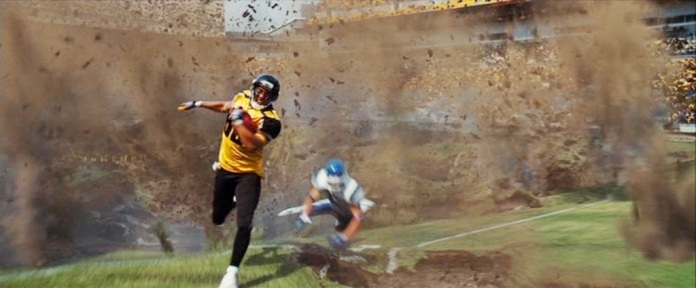
Perhaps this could be handled in a way that suggests more a conflict of essential spirit— communality vs. anarchy, group will vs. individual, etc.—but I’d still like it to make a lick of plot sense, and the film’s flat-footed imagery and insistent literalism doesn’t communicate it as symbolism, anyway. The constant pseudo-biblical invocations of the villains are meant to sound very impressive, and they do admittedly call to mind the similar language of Osama Bin Laden and others of his ilk. But in the real world, the use of such phraseology tends to be deeply entwined with less abstract concepts, like resentment over historical injustices and inequality, whereas here there is no substance standing behind the statements. The process hinted at throughout these films, that the name “Gotham” is actually standing in for “America,” is now completed. Whilst the opening scene seems to cast a livid eye on the brutality and risky morality of the War on Terror’s renditions, the film goes on to conflate the Dent Act, which is in danger of being repealed or expiring through lack of interest, with the Patriot Act, and just at the point where it seems irrelevant, a handy threat comes along to revalidate it.
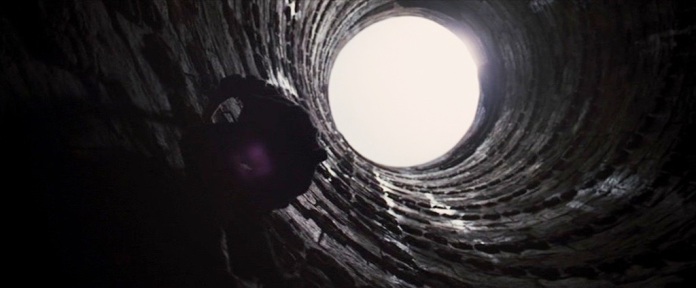
At last, the martial defenders of order must reassert authority and cohesion in the face of terrorists who are either domestics left out of capitalist triumphalism—the army of orphans and outcasts Bane has assembled—or hazily foreign insurgents who have spent formative years in that prison in “one of the world’s more ancient countries.” So, under its surface, the depiction of Wayne as the toppled tough guy who must overcome his privileged coddling to get back on top becomes as naked a metaphor for resurgent American triumphalism as Rocky IV (1987). Selina, who styles herself as a Robin Hood of the underworld, ultimately has to make a choice between the sides, and goes with the guy with the shit-hot car. Incoherent and suspiciously conservative-pandering political dimensions aside, The Dark Knight Rises could still work, if given room to breathe, as a fable. That is, essentially, what Nolan is trying to make, in spite of all the trappings. In this regard, he does make it part way to the heights he’s after, especially in the all too obviously symbolic climb Wayne has to make to escape the jail. (In yet another instance of Nolan’s weak visual exposition, he never bothers to analyse for the eye why escapees can’t just keep climbing up the safety rope they have tied to them instead of having to make a dangerous leap to a distant ledge.)
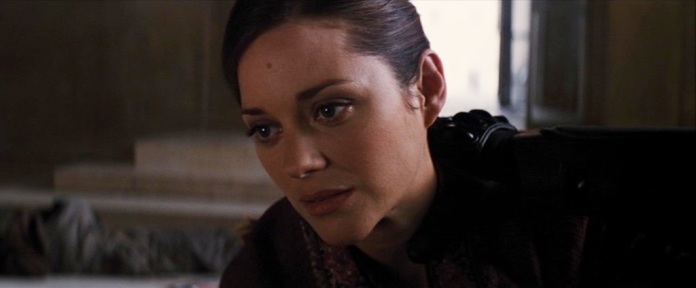
In a pretty nice bit of narrative switcheroo that would be worthy of one of The Prestige’s protagonists, the child we’ve seen escaping from the prison proves to be a girl rather than a boy: Talia al-Ghul, alias Miranda, the real engine behind Bane’s efforts, born of Ra’s’ lover in the prison where she was cast by a warlord. Bane was her jailhouse protector and surrogate brother, a late touch that finally gives Hardy’s hulking villain role a touch of pathos. Bane has the body and mask of a Mexican wrestler, the accent of a James Bond villain, and the wheeze of Darth Vader. Nolan clearly wants to endow him with something of the mixture of gentlemanly cunning and perverse intelligence and feral ferocity of a good Bond opponent, but Hardy is awfully hamstrung by having to communicate personality through said mask. Cotillard similarly barely registers in her role, betraying the Nolans’ permanent embarrassment in contending with the intimate in her romance with Wayne. She does at last find purpose when her villainy is revealed, but by that very late stage, it can only be exerted in the most blunt and curtailed of expressions.
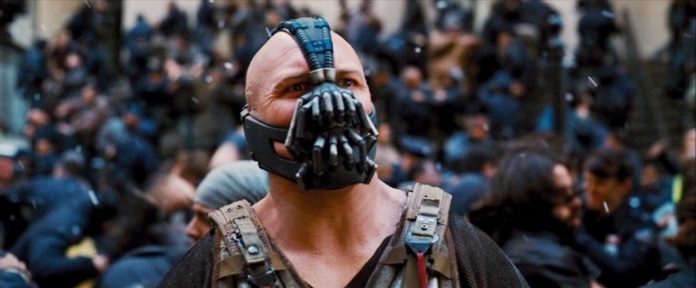
Nolan’s sense of scene grammar and expositional logic haven’t improved: characters go in and of focus, disappear for long stretches and then come back with a startworthy suddenness, travel around the world in the blink of an eye, and turn up where they shouldn’t be. Cillian Murphy’s Jonathan Crane, alias The Scarecrow, from Batman Begins, turns up presiding over the revolutionary court out of nowhere. Presumably, he’s been released from the prison, but he then disappears, his presence just another momentary diversion for the eye that feels a little like a Laugh-In sketch; here come the judge, indeed. Selina tells Wayne that she’s led him into Bane’s trap because she’s afraid his men will kill her, and Stryver does indeed try to do that, but later Selina is able to move among Bane’s cohorts and even give orders to lesser underlings: why and how she can do this is again left frustratingly fuzzy.
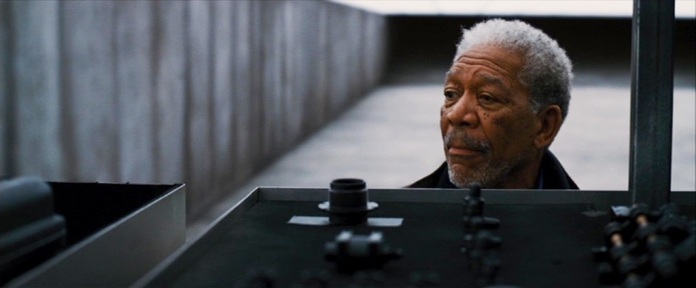
In spite of the general problems with his filmmaking, Nolan does have a talent for weaving together some striking individual scenes and movements, and here is where The Dark Knight Rises ultimately does offer interludes of nagging power. Batman’s first return to the fray is a little rousing, and Nolan goes to town in the lengthy sequence in which Bane’s plan begins to move, commencing with his breaking of Wayne, and then moving out for a spot of mass terrorism, causing grandiose carnage at a football game that sees, like some particularly malicious gag from The Simpsons, a player making a dash for the goal line only to turn and see the entire field and his fellow players swallowed into a crater. Here, at least, Nolan’s perpetual-motion editing strikes the right notes of frantic dissolution of order as Gotham falls to its conquerors. Hans Zimmer’s score works best here, too, though elsewhere it combines with the barrage of sound effects to form a wall of bullying, Pavlovian noise. Ultimately, whilst it clearly wants to rise to the level of the Star Wars films and the best moments of James Bond’s long franchise, The Dark Knight Rises felt to me more like the capper for another pop phenomenon I could never warm to, The Matrix Revolutions (2003). Like that film, it attempts to sustain the superstructure of a genuine saga, and yet still manages to wind up with a fist fight, preluded by Batman and Bane swapping the most laboured taunts I’ve heard in all my born days.
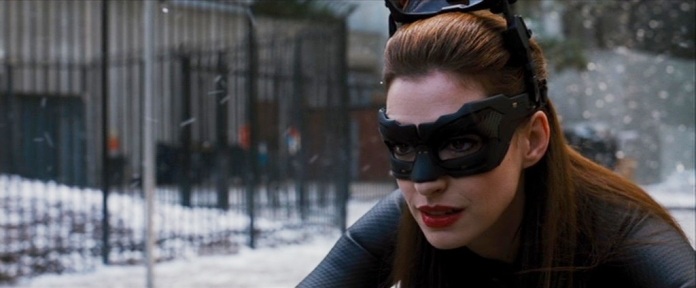
What does finally keep this film afloat, however, is Hathaway’s presence and performance as Selina. It probably won’t prove as much of a lightning rod for neo-punk fervour that Ledger’s Joker did, because the sex appeal of spunky female characters so often tends to get in the way of more general appreciation and because she’s less of a gnomic force. But in many ways, Selina is an even better play on the familiar comic book character, transferring her essential spirit from the sources intact. In her inevitable skin-tight outfight and dominatrix heels, every inch of her is deadly in one fashion or another: in one of the film’s wittiest moments, one of Dagget’s henchmen asks her, “Do those heels make it hard to walk?” Selina promptly cripples him with a kick of those wicked spikes and asks ever so coldly, “I don’t know, do they?” She alone finally brings to Nolan’s series something of the essentially Freudian edge of the comics, where every character feels like pieces of a schizoid personality, the feminine, criminal flipside to Wayne’s masked warrior, a perfect mirror-mate.
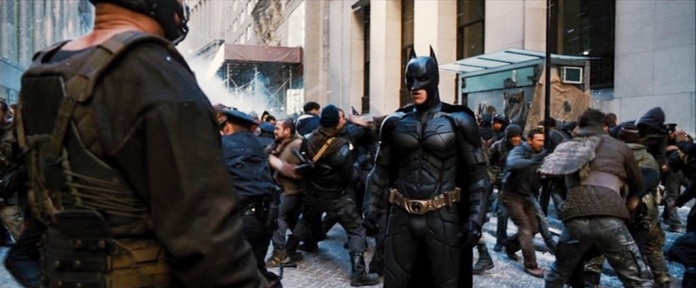
Whilst not as keenly self-aware as a self-constructed icon of antipathetic sexuality as Michelle Pfeiffer’s great incarnation from Batman Returns (1992), Hathaway sharpens to a point the character’s sense of impudent humour and strident, self-willed individuality, as well as her edge of fetishist provocation. In so doing, she gives The Dark Knight Rises some desperately needed comic relief and the Dark Knight himself a desperately needed personality, by dint of having enough for two. The only problem is that Nolan doesn’t always know what to do with her: Selina disappears from the movie for a great chunk of running time, and she’s almost buried under a heap of unnecessary gimmickry, like her efforts to get hold of some doodad that can erase her past. Finally, however, Selina gets to play Han Solo to Batman’s Luke Skywalker, coming back to save the day in the nick of time. In spite of her faint Sapphic associations and proclaimed contempt for good, she falls enough for our hero to share a marvellous farewell kiss with him, representing the first time in this series I’ve ever felt a hint of emotion with a protagonist. Selina is good enough a thief to steal the movie out from under everyone’s noses.

Ugh. I had a hard time with The Dark Knight Rises. But, then again, I always do with Nolan’s films. It’s Nolan. I suppose I could add on in agreement to your assessment of the film’s sketchy sociopolitical themes or further criticize the whole enterprise, as many have done, for sucking dry any sense of fun and escapism from the comic book premise.
Yet my issue with this film is something more core: Nolan is a bad visual storyteller. When he’s not using the cinematic medium for noisy spectacle, he’s merely using it as a recording device for check-listing “script stuff”. I’ve said this before about the two predecessors (along with Nolan’s other films) and I reiterate, with even greater emphasis, that The Dark Knight Rises is about as visually/narratively/dramatically engaging as major, Hollywood budget episode of Law & Order, which is a roundabout way of calling the film cinematically bland. I understand that Nolan wants to immerse audiences into a Batman world of urban realism and, admittedly, in an art-directorial sense, he does pull off his postmodern aesthetic with panache. But his idea of the docudramatic visual aesthetic lacks actual technical talent and ends up feeling derivative of aforementioned TV procedural dramas.
If you want an example of loosed camera work artfully capturing the vitality of intense moments, observe Michael Mann’s Miami Vice or Public Enemies, where the handheld is alive but never disorientating; tittering and unstable while still maximizing the frame end-to-end with evocative compositions and deep focus perspectives. Nolan, however, does very little with framing. I find it rather ironic that a director who’s constantly showered with praise for using IMAX grandeur is so infatuated with monotonous medium to medium close-ups, laboring through a one-thing-at-a-time visual report via awkward and often unnecessary coverage/inserts coupled with erratic editing.
Also, for a film that relies so heavily on plot logistics, Nolan seems utterly incapable of properly, let alone interestingly, telling a story geographically: various characters jumping around locations during citywide mayhem or when trying to track a superball atomic bomb, for example, feel less like sequences playing out excitingly through well storyboarded action and more like directionless motion in constant need of someone explaining at any given moment, with audit-like dialogue, where’s where and what’s what. It’s clumsy.
On a larger storied level, instead of visualizing his themes with grace, Nolan prefers to bludgeon them (and us) with ham-fisted monologues.
Yet The Dark Knight Rises is not without its qualities. Easily for me, the film’s best set-piece is the first confrontation between Batman and Bane. This is the one extended moment that stands apart almost entirely from the overstuffed subplots, exposition and histrionic performances, striping the film down to its basic and best storyline: Batman fighting Bane, and losing; what that means for the character, where it leads him psychologically and what he has to do to make it back. It is this moment in the film where the story isn’t being telegraphed through plot-points or thesis-speak, but is actually playing out through action and straight narrative. It’s raw and primal. And for once Nolan’s visual approach somewhat benefits the nature of the scene, the desperate futility of Batman yelling and punching into the monstrous wall that is Bane. I like how our hero is tossed over a railing and dowsed in water in a way that completely robs him of his dignity, leaving only an aged mortal man in cumbersome body gear. I like how Bane mocks his toys and tactics; a villain who laughs at Batman in the dark? Talk about emasculating.
I just wish the rest of the film could have remained as focused both visually and thematically on what’s important. I actually have a lot of respect for Nolan as far as his ambition goes, I simply do not dig his storytelling sensibility nor his filmmaking technique …or lack thereof.
LikeLike
I had a serious problem with the sound, because much of the soundtrack is ominous sounding bass tones. Combined with Bale’s hoarse voice and Bane talking through a mask, this made much of the dialogue hard to hear.
I was thinking that if you shot the bomb with a missile, it would be destroyed without destroying most of Gotham City. (It’s not that easy to sustain a fusion reaction.) I wouldn’t want to try this myself; that’s what delegation is for.
LikeLike
Cannon: Your experience of Nolan is fundamentally similar to mine: in spite of my criticisms of Nolan’s intellectual pretences, his visual lacks are my first and last issues with his cinema – the whirlwind leaps between long shots and close-ups, the hazy geography, the incapacity to vary his rhythms. I particularly appreciate your comments relating to Michael Mann’s visual stylistics, because whilst Nolan does indeed ape Mann’s sense of urban steel, concrete, and gun-barrel-grey chic, as was much remarked upon at the time of The Dark Knight, he completely fails to grasp the specifics of Mann’s style. I insist that a film should be a repository of plastic (in the original sense of the word) beauty in some form or another, but Nolan has simply struck an uncomfortable balance between the cubism of Paul Greengrass and the minimalism of Mann in the name of immediacy, and what we are finishing up with, increasingly, is “point camera in the same basic direction as what we should be paying attention to, and edit when you feel like it.” Nolan does know how to do visual patterning, as is plain in Memento and The Prestige, but he loses his grasp when it comes to placing the actual weight of action on his camerawork.
I appreciate that you got something from what Nolan was going for in the first Bane-Batman confrontation, with its dire consequences – that sense of pummelling, immediate endangerment for our hero is alarming, as there was something of a dinosaur-like relentlessness to Bane’s strength, making it clear that Bane could kill Wayne if he wants, but doesn’t want to; the effect of Bane’s potency both in his body and his sneering contempt, was strong enough to linger for me through the rest of the film, and I will admit to having anticipated seeing his ass kicked, which was partly answered in the finale even if in the dumbest of fashions. The whole idea of the scene, borrowed as it is from one of the comic books, is quite marvellous. But somehow I feel that Nolan again fumbled it with his lack of technique again, in how to capture the import of the moment: he plays the motif of Selina’s watching it all with growing disquiet, but frankly it needed more; more drama, more pain, more shock. It just…happens, just as Batman then just happens to come back.
Syd: Yeah, the sound was often fuzzy, especially when you had music on top of ambient noise on top of dialogue, without the slightest bit of care of design. But, you know what? I had no trouble understanding Bane. I got the feeling that Nolan and Hardy had worked over his bits a lot to make his voice muffled but audible, and I could often understand him better than other actors. But who said anything about putting the fusion reactor on a missile?
LikeLike
Nobody can complain about being short changed by a Rodney Heath review, especially when he’s been irked. As I was reading, I kept making mental notes of things I wanted to say, but like a French infantryman discarding his weapons on the retreat from Moscow, my mind could only hold on to a few bare essentials.
I think the review was particularly acute on the shortcomings of Nolan as a director and writer. Somewhere I said that I thought Nolan had a vision, but lacked the cinematic flair to realise it. This probably puts it better: “More to the point, Nolan still has no fundamental feel for the expressive rhythms of a film.”
For me, Nolan flirted with some interesting ideas, but failed to score with any of them. I was intrigued when at first the film appeared sympathetic of the idea of the have nots being justified in taking from the haves, but it quickly retreated into trusting to the noblesse oblige of our elites and their lieutenants. Did this confusion mirror the lack of clarity in Nolan’s own thinking or, should we givie him the benefit of the doubt by allowing that he was probably constrained by the material and studio and audience expectations. I mean, just what is the subtext of a fucked-up rich guy being our saviour?
I also agree with Rod railing at the unexplained leaps in the narrative, which I found to be either lazy, cynical or just plain bad filmmaking.
And I felt sorry for Michael Caine for having to lend feeling to scenes that lacked emotional imperatives or consistency.
LikeLike
Jeez, Jeremy, after more than a decade arguing on line, don’t you think you could get my name right? 😉
“…it quickly retreated into trusting to the noblesse oblige of our elites and their lieutenants.”
Well said.
“Did this confusion mirror the lack of clarity in Nolan’s own thinking or, should we givie him the benefit of the doubt by allowing that he was probably constrained by the material and studio and audience expectations.”
A bit of both, I think. Frankly I don’t think it’s that hard, morally or artistically, to give Bruce Wayne the right grounding that makes his noblesse oblige agreeable, and yet Nolan consistently fails to evoke it, and he also fails to give us any real meat for a more ironic take on it. The probing is constantly weakened by the assurances that Wayne is always a good guy – look, he’s made himself nearly poor by funding a fusion reactor! What a fine, charitable, dingbat rich-guy thing to do. The tension would have worked better if the film dared to present Wayne as a compartmentalising, but no can do. Tim Burton easily and successfully synthesised a link between the big and low ends of town for his villains – Penguin’s partnership with the fascinatingly self-deluding Max Schreck – whilst Nolan’s boardroom baddies are entirely cardboard. So I can’t let Nolan off the hook by saying, oh, that’s just part of the general texture of the material. Nolan, and his audience, are so much in love with the idea of his villains as marauding forces of pure chaos, “delighting in whatever reaction he can elicit from a world numbed by modernity” as one description I read of Ledger’s Joker just today puts it neatly (and yet this intent is not stated in the film; it’s inference that others have made), that the reflections on vigilante justice and real-world context are rendered automatically defunct. There are always different inflections one can give a story no matter the production contexts. Nolan won his fumbled, pseudo-reactionary political message; he can wear it.
If I can congratulate Mr Caine on one thing, it’s that his professionalism always shines through. He tackled every moment he was on screen like he was soloing in a Rachmaninov concerto.
LikeLike
Apologies, Rod(erick)
BOB: Well, what about Wodewick, then?
CROWD: Yes! Welease Wodewick! Welease Wodewick!
…
CENTURION: Sir, we don’t have a ‘Roderick’ either.
PILATE: No ‘Woger’? No ‘Wodewick’?
CENTURION: Sorry, sir.
PILATE: Who is the ‘Wodewick’ to whom you wefer?
BOB: He’s a wobber!
…
PILATE: He sounds a notowious cwiminal.
CENTURION: We haven’t got him, sir. Mm hm.
PILATE: Do we have anyone in our pwisons at all?
LikeLike
Dammit, this requires the “like” button.
LikeLike
I wrote (on spanish) my review about this low end to “The Dark Knight” saga by Mr. Nolan. Another false step in his career, like Inception.
One thing: The scene with Bane and his army in the Stock Exchange is by day. They escape inmediately and the chase-scene is by night. Are your kiddin’ me?
Really nice, Rod.
http://aquiescencias.blogspot.com/2012/08/the-dark-knight-rises-de-christopher.html
LikeLike
Outstanding evaluation. I found myself nodding my head in agreement with as I read your article. Most of Nolan’s films leave me feeling cold, wanting something a bit more. TDKR was no exception. It was a breath of fresh air as I watched Inception, as it had some emotion to it, not forced like the rest of his movies feel. However, his storytelling is unparalleled to other directors in Hollywood today and I still look forward to his films…I just hope they have some life to them, like The Dark Knight.
LikeLike
It’s a movie I enjoyed but can’t defend. As an old comics fan I couldn’t help but be gratified by a lot of what I saw — though many other fans feel differently — but I couldn’t deny the raw incompetence of much of the script. Your description of the film as a nearly three-hour montage sums up nicely the widespread feeling that it’s bloated yet missing important details. Maybe a three-hour trailer would be more accurate. Nolan crafts great still images but in crafting narratives he seems to have gone backwards. Even the best parts — mostly those dealing with Selina Kyle — feel off because he’s trying to achieve closure in three hours where the comics have cultivated mystery and pathos in the Batman-Catwoman relationship for seventy years. There’s little point to giving them a happy ending without the feeling that they’ve taken a long, long time to get there. On Nolan’s own terms, the wrap-up is plausible yet still feels abrupt and obligatory, as if the he expects audiences to fill in the blanks. Not everyone will, or will care to.
LikeLike
Duroc: Google Translate tells me that on your page you have reviewed The Dark Knight Ascends. Thanks, Google Translate. You know, I hadn’t even noticed the day/night thing, but now that you have…*forehead slap* I do recall it was still day when they first escaped the exchange, but yes, then night falls real fast. Were they really riding around for an hour? I did also dig your theory that Hardy’s role in Bronson perhaps won him this part.
Alley: Like most of Nolan’s work, Inception drew me in with an interesting set-up that the act of actually watching saw me grow gradually more frustrated and bored. Perhaps now that his obligations to Warner Bros and this franchise are over, Nolan will have time to sit down and properly think a movie through.
Samuel: “…because he’s trying to achieve closure in three hours where the comics have cultivated mystery and pathos in the Batman-Catwoman relationship for seventy years…”
Well put. Also, was that Selina with him in Florence at the end? Given that Nolan wouldn’t give her focus, preferring his throwaway glimpse of Wayne post-Batman, I was left unsure. Of course, I want it to have been her, and the thought of Wayne and Kyle living out their lives in an Italian bonkfest certainly appeals…I am certainly bewildered about how one can make a movie that is nearly three hours long and yet make it so rushed and lacking precision of detail. “A three hour trailer” does indeed fit just as well; in fact that film displays a trailer aesthetic – bombarding music, stentorian dialogue, striking but jumbled images – has essentially taken control of Hollywood product. Still, yes, I agree that Nolan does have a capacity to craft great images – those sandcastle skyscrapers in Inception are genuinely memorable and properly surrealist. Only the context lets them down. Perhaps if Nolan throws out narrative altogether and becomes an abstract film artist, then he will have found his calling.
LikeLike
As a die-hard Nolan fan, I must say I agree and disagree with your review.
I agree that Nolan tries to handle more plotlines than he can, but when I compare The Dark Knight synopsis to The Dark Knight Rises, I much before the finale over the sequel. The Dark Knight rests solely on Heaths amazing performance, and there’s nothing else that holds my attention. (Except for the horrible miscast replacement of Katie Holmes). The Dark Knight Rises, I felt, brought back more of what the original had for Bruce – an origin of overcoming his fears/failures, which ties the movie together. If I have to a choose between a film with little to no plotline vs too many plotlines that rushed to completion, I choose the later.
After the first scene with Bane in the airplane, I feel that much of the movie doesn’t pick up again for me until Bane rules over the stockmarket, football field, etc. I felt that what the movie lacks in cohesive storylines, it balances out with the increase of characters…if that makes sense? 🙂
I must disagree that Anne Hathaway did not keep the film afloat for me. I’m not a Hathaway hater, and I quite liked her chemistry between her and Bale. However, her performance is quite uneven. In comparison of her scene stealing the pearls/the bar brawl scene to her scenes solely with Batman, there’s an uneven and inconsistency with what she is trying to deliver as Selena. I felt she was awkward and incomplete as a character.
LikeLike
“Except for the horrible miscast replacement of Katie Holmes…”
You mean, Oscar-nominated, talented and adorable actress Maggie Gyllenhaal?
LikeLike
I’ve steadfastly stayed away from this thread since it posted nearly a week ago, not because it was alienating to me, but more that its erudite thrust was intimidating for a non-fan of the genre. Ha! I also balked on Sam Wilson’s excellent piece on it a few weeks back. It another astounding piece of writing (though the word ‘piece’ seems wholly insufficient) on a film that certainly has been the subject of musch discussion since it’s release, forever tarnished by some by unconscionable tragedy. While I am no big fan of the superhero movie, I have regularly been abducted by a family of maniacal fans, one of whom has exceeding talented in drawing, and who applies that talent on all his favorite superhero characters. Despite my general indifference to the genre I will concede this particular film was very well done (Nolan is easily the strongest director to ever helm any of the films) and love the final 40 minutes or so right up till that buffo Italian cafe scene with Michael Caine’s wink. Caine and Hathaway were quite good, as was Bale, who finally and rightfully received the main focus.
In any case I am well-aware that my modest celebration must be tempered by the fact that you have penned a subtle but unmistakable takedown, one that concedes strengths but mainly takes Nolan to task for what you feel is a lack of connection to much of the material. I am hardly prepared and willing to go to the mat for this film (or any superhero film) as ultimately they are forgotten just a short time afterward, but aside from one disclaimer you make that I completely agree with (the visual pattern being more in line with a montage) I feel Nolan has in large measure elevated these kind of film like no other director who has taken the gauntlet. But you have painstakingly and with your usual incomparable skill made quite a case for the issues that you feel keep this film from achieving the exhalted level that many others feel is has achieved. Fair enough.
LikeLike
I can only sigh in exasperation, Sam. But thanks for still working up the will to comment.
LikeLike
It’s been fun watching Nolan turn the comic book film on its head but its time to get back to some real work now. More excited about his next project (outside of Superman) to see where he goes after Inception.
LikeLike
“More specifically, Nolan buys into Dickens’ knock-kneed English liberal vision of the Revolution as badly shaven creeps in seamy, raffishly worn uniforms dragging random citizens to trial in an orgy of bloodlust, and bypassing the specific background of political paranoia, war, and high-profile defections, which turned the Revolution’s moment of transformative energy into a grim spiral of political homicide.”
I’m sure this isn’t what you were going for, but this sounds a lot like excuse-making for the atrocities of the Revolution. Sure, Robespierre murdered almost countless innocents of all classes and political persuasions, but hey, things were stressful and it made sense that he would start to see terror as “an emanation of virtue”, right?
I don’t take very seriously critics’ complaints about the plot to TDKR; if something happens in the movie, then it happens in the movie, and if there’s no explicit explanation, I don’t mind letting the story move on with this lack of detail. What I DO take seriously are some of the political accusations being lobbed at the film. It’s becoming almost a truism of critics that the film is some sort of right-wing nightmare about the terror of revolutionary uprising against the corrupt 1%. If this movie is actually a condemnation of revolution, then really it’s the most polite possible condemnation of revolution. If it were actually going to be about the French Revolution, it would have to make a bunch of changes: random decapitations of authority figures; random terror and executions of all sorts of innocent people, not just the one-percenters like Daggett and Stryver who are obviously guilty as charged; the purging of society on genocidal levels, like we saw in Russia, China, and Cambodia. Since Bane’s plan was to let the city prove its own decadence for five months before executing his wrath and destroying it, he seems less like a revolutionary reformer to me than a sheer nihilist. He’s less Club Jacobin, more Project Mayhem.
I wish the film had been as bold as some of its critics claim it is. I wish it had made Bane a genuine revolutionary demagogue, rather than someone who simply mocks revolutionary pretensions. (Did you hear that sneer in his voice when he said, “We are taking power and giving it back to you… ‘the people.'”) I wish it had shown a full-blown reign of terror rather than just a quick montage. I wish, in short, it had made him a villain like the kind of villain we actually saw during the French Revolution (or the Russian one, or the Chinese one). But the theme of these films has always been hope versus nihilism (Bane is closer in spirit to the Joker than to Robespierre), not order versus revolution, so I guess that wouldn’t have worked.
If you want to see a Batman story that’s genuinely shameless about its anti-liberal-intellectual credentials, look at “The Dark Knight Returns,” the Frank Miller story (and now movie). Now THERE is fuel for political argument.
LikeLike
Rod,
Just read this, and I largely agree. I kept thinking that you had stated so neatly what I had previously felt.
The Dark Knight Rises (like many Nolan films) is a frustrating experience because you can still hear the strong basic ideas whispering at you faintly beneath the cacophony of incoherent exposition and action, not to mention Zimmer’s mighty *bwaaaamp* score. But then you try to pick these ideas out and line them up into some sort of cohesive statement, and they don’t fit together. Nolan himself admitted in an interview (regarding the politics of TDKR, but it certainly also applies to the film as a whole) that he just wanted to throw elements up and see what sticks.
Also frustrating is that Batman Begins actually had a sense of the personal and the mythic to it, which is mostly lost in TDKR, except in explicit callbacks—like the desert prison mirroring the well that young Bruce falls into, or the bats flying out and startling him as he climbs echoing the (for me at least) spine-chilling moment when he stands, surrounded by whirling bats, when discovering the Batcave.
I’m also interested in your more positive outlook on The Prestige, which I consider the perfect Nolan film in that it is a tight and clever puzzle that shares a wicked trickiness with its subject matter and protagonists. I would love to read any further thoughts you have on it.
LikeLike